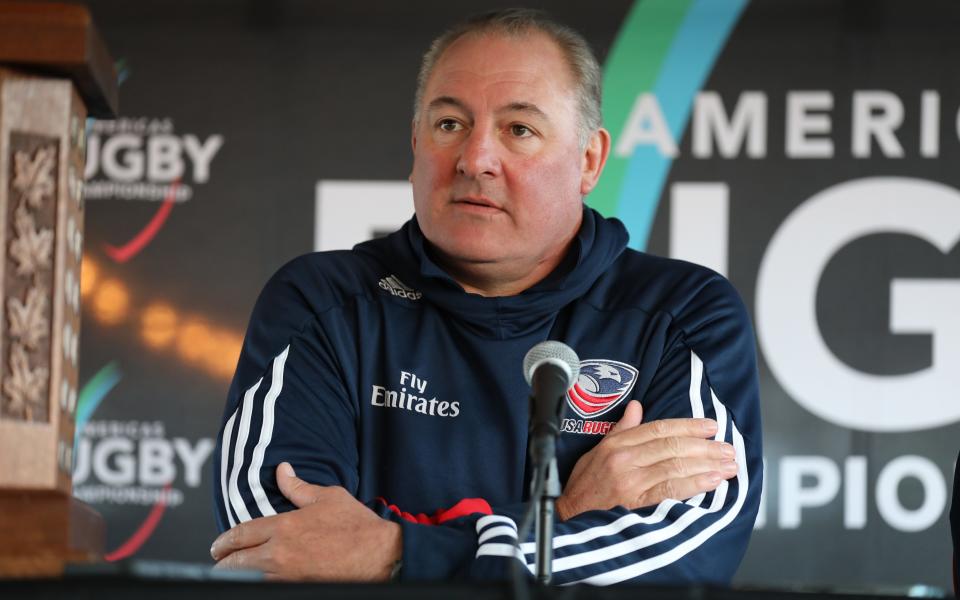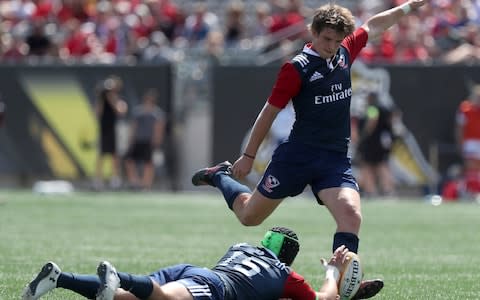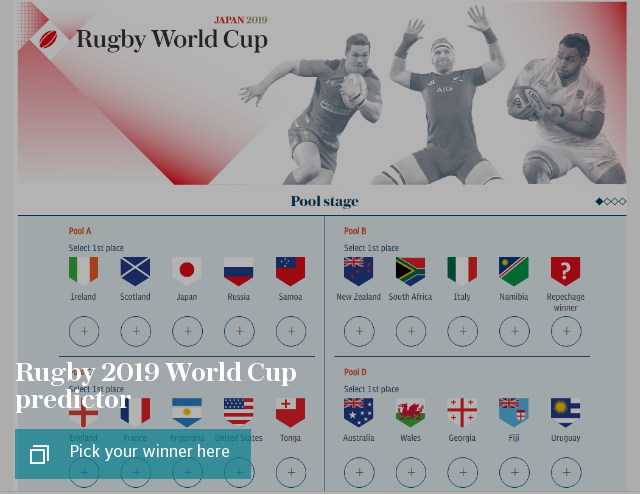USA head coach Gary Gold on the historic win over Scotland and his admiration for Ireland's pro model

You can be forgiven for writing the USA off when they were down 21-6 just before half-time against Scotland. Margins of that size between tier one and tier two nations are not usually reversed.
Joe Taufete's brace of tries, a further score for Hanco Germishuys and nine points from the fly-half AJ Macginty flipped the game on its head to leave the USA ahead by six points with time almost up. Scotland rallied, Dougie Fife crossing in the corner to leave Blair Kinghorn, winning only his fourth cap, with a touchline conversion to win the Test.
"What was so encouraging to see was the build-up of the work from the players in the week and what we set out as coaches, that if we were accurate in certain areas we would give ourselves a chance," explains USA head coach Gary Gold.
"The calmness of the leadership group of the players at half-time... knowing we were 21-6 down but seeing what we did wrong and that if we cut out those mistakes we could still stick to our processes. We scored ten points in the first seven minutes of that second half, closing the gap quickly brought the confidence back again."
Kinghorn's effort fell wide and the USA partied like it was 1924... given that was the last time the USA had defeated a 'tier one' side, beating France 17-3 in Colombes.
"It was wonderful to hang on for the win, but we must be honest: if they kicked the conversion we’d be sat here saying “that was really close”, so I like to keep perspective of things. Unfortunately I’ve been on the good and bad side of those things many times. But it was a very satisfying day," admits Gold.
"The players stuck to the process of what we’re trying to do, especially in the second half, and they got the reward. I would like to believe that if we were to play the top five or six in the world, nine times out of ten we would get beaten, but I’m hoping we would be competitive and show that we were improving."
Part I: The funding and logistical challenges facing the USA
This was THE moment.
���� pic.twitter.com/dwV3AslUsU— USA Rugby (@USARugby) 17 June 2018
Gold unquestionably has some talented players to pick from, including Sale fly-half AJ Macginty and exciting young Cheetahs scrum-half Ruben de Haas, who is still only 19 years old. The key issue however facing the USA is what happens when those leading players are unavailable, leaving significant gaps.
Which is where Gold's admiration for the system established in Ireland between the national side and the four provinces comes in, particularly regarding the case of former Ulster scrum-half Ruan Pienaar, where developing young talent is now paramount.
"As a front-line team of 23 to 28, there are some really good players there who can play for the Eagles. Where we struggle now is strength in depth. So if you lose a Joe [Taufete’e] and you have an injury somewhere else, or if Samu Manoa or a Blaine Scully or AJ MacGinty are not available, the drop-off is quite large.
"The challenge between 2019 and 2023 is to build that depth chart, to make sure you are four to five deep, like Ireland have done over the years. Ulster having to move Ruan Pienaar on because he was blocking the pathway is such an impressive high performance model.
"Ruan was outstanding for Ulster and spent nine amazing years there, but the overriding factor was that he cannot be blocking the pathway. I’m so impressed with Ireland as a rugby nation, because there is a proper strategy and they are not ranked second in the world now by accident. That’s what the USA need to do now.
"There’s not enough time to implement that between now and the Rugby World Cup, so we need to rely on the group we have now to be as competitive as possible. But with Major League Rugby having kicked off successfully and the buy-in from the Colleges in the United States, we need to have a definitive strategy of how we are going to build that depth chart and to not rely on one or two key players in each position.
"[Scrum-half] Ruben de Haas is a very important project, because you need three players competing for that position and they are all young enough to be involved for the next Rugby World Cup cycle."

Gold arrived from Worcester Warriors in January with 22 games to go until the Rugby World Cup. Seven of those have now been played, all victories, except half took place with Gold selecting an entirely different set of players in the Americas Rugby Championship due to the unavailability of those squad members based in Europe and beyond.
"We were a lot better in June than in the ARC, because we could not get our players in from Europe and so we had to chop and change the team after three weeks. That was chaos for me. I didn’t feel there was a way to create decent continuity and had to start all over again," Gold reveals.
"In hindsight, those messages has now spread over 50 guys instead of 25 and so it has actually worked out quite well. We’re very clear in terms of our objectives, our strengths but also our frailties. If we build on those and pick up some results, that’s great, but I don’t want them to get in the way. Say Blair Kinghorn kicked that goal; we were still in our process. Wrestling the game back into our control was more satisfying than just the win.
"Had you asked me after the ARC, I’d have said we were unhappy with what we were trying to achieve because of the chopping and changing of the squad, which was no one’s fault, that was the way it had to be. As a tier two country, we’re trucking nicely. The more players on that depth chart the better, because injuries can come along and disrupt everything."

Time difference worked in Gold's favour when it came to watching the June Test series between South Africa and England over breakfast ahead of the USA's Tests later in the day.
His ties with Western Province and South Africa - Gold worked with the Springboks for three years as an assistant coach - naturally left him feeling pleased for Rassie Erasmus with South Africa beginning to show signs of life ahead of the Rugby World Cup. As for England, the USA's opponents in Japan next year, in Gold's eyes there is no reason to panic despite one win from their past six Tests.
"It was a fascinating series. That first Test [in Johannesburg] was a wonderful rugby spectacle. England will feel pretty unlucky to have lost the series, but seeing a good friend like Rassie doing well, I’m happy that the Springboks are back playing competitively again.
"I certainly don’t think it’s doom and gloom for England though, given the guys that were missing on tour. Eddie is probably right: it’s probably not a bad thing for that tour to happen now ahead of the Rugby World Cup. He has seen people perform when the pressure is on and learnt a lot about players. He’s a really wise guy and knows what he’s doing. Sending coaches out to Japan later this year to work there, he’ll be very well prepared.
"The one thing with Eddie and his knowledge of Japan, you must not underestimate how much of a heads-up he and Steve [Borthwick] will be able to give the guys about touring there, because it’s a tough country to go and tour for the first time, let alone to try and win a Rugby World Cup in."

Gold's own time with Japanese side Kobelco Steelers will prove similarly beneficial for a USA squad who will head to Japan with no expectations regarding their prospects. Their pool is exceptionally difficult, alongside England, France, Argentina and Tonga, with an unforgiving fixture list.
Then again, no one was expecting the result against Scotland, a welcome shot in the arm that has understandably led to a new wave of optimism about rugby in the USA.
Longer-term issues - creating a network for emerging players and growing the sport through the new Major League Rugby professional league - are more pressing priorities than thinking about winning a Rugby World Cup. Gold just wants his side to be competitive. And from there onwards ahead of France 2023, to target a spot in the world rankings top ten.
"It’s such a tough pool. The toughness of the draw, really. England first, then France five days later, then Argentina five days after that. Then the one team we can probably have a go at in Tonga, who are playing bloody good rugby by the way, we face three days after. I don’t know if I’ll have any players left by that time!
"We’ll give it a hell of a shot and I really hope we’re competitive. I just want supporters to see that we know what we’re doing. I don’t mind if we are beaten by a better team, but I want us to be fit enough and to ask questions of opposition. If that lasts for 80 minutes and we win one or two games, that’s great.
"This is a good start for the next four-year cycle when there needs to be some pressure on ahead of going to France, targeting a quarter-final in 2023. That would be a good objective. As would being a top ten side in the World rankings. It’s not inconceivable that USA Rugby as an organisation should be targeting a top ten ranking, and that needs to start at the top and work all the way down through MLR and the colleges."

